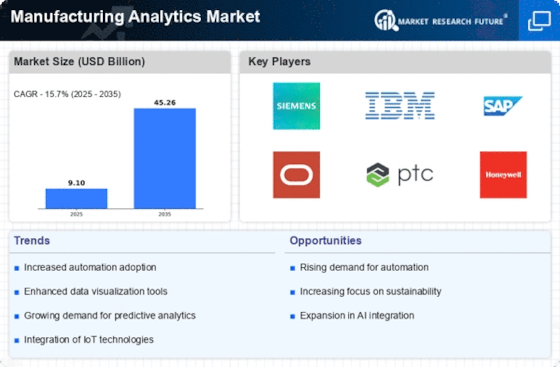Market Share
Manufacturing Analytics Market Share Analysis
The Manufacturing Analytics market is significantly influenced by various market factors that collectively shape its dynamics and growth trajectory. One pivotal factor is the increasing adoption of Industry 4.0 practices across manufacturing industries. As companies strive to enhance efficiency, reduce costs, and optimize their production processes, the demand for analytics solutions has surged. Manufacturers are recognizing the value of data-driven insights in improving decision-making, predicting maintenance needs, and optimizing supply chain operations.
Moreover, the growing complexity of manufacturing processes and the abundance of data generated within these processes contribute to the rising need for analytics solutions. Manufacturers are faced with vast amounts of data from various sources, including sensors, equipment, and production lines. Analytics platforms help make sense of this data by providing actionable insights that can be used to streamline operations, identify bottlenecks, and improve overall productivity.
The increasing focus on quality control and risk management is another market factor influencing the adoption of manufacturing analytics. In an era where product quality and compliance with regulations are paramount, manufacturers are leveraging analytics to monitor and control the quality of their products in real-time. This not only helps in maintaining high standards but also ensures regulatory compliance, mitigating the risks associated with non-compliance.
Additionally, the rise of predictive analytics is playing a crucial role in shaping the Manufacturing Analytics market. Predictive analytics enables manufacturers to forecast equipment failures, identify maintenance needs proactively, and optimize production schedules. This capability not only reduces downtime and maintenance costs but also contributes to overall operational efficiency.
The globalization of supply chains is a key external factor impacting the Manufacturing Analytics market. As supply chains become more intricate and span across multiple regions, manufacturers are leveraging analytics to gain visibility into their entire supply chain network. This enables them to make informed decisions about inventory management, demand forecasting, and logistics, ultimately improving the overall resilience and responsiveness of the supply chain.
Furthermore, the increasing adoption of cloud computing is influencing the market dynamics of Manufacturing Analytics. Cloud-based analytics solutions offer scalability, flexibility, and cost-effectiveness, making them an attractive option for manufacturers. The ability to access analytics tools and insights from anywhere, at any time, enhances collaboration and decision-making across different organizational levels.
The emphasis on sustainability and environmental responsibility is also impacting the Manufacturing Analytics market. Manufacturers are using analytics to monitor and optimize energy consumption, reduce waste, and enhance overall sustainability in their operations. This aligns with the growing awareness of environmental concerns and the need for businesses to adopt eco-friendly practices.


















Leave a Comment